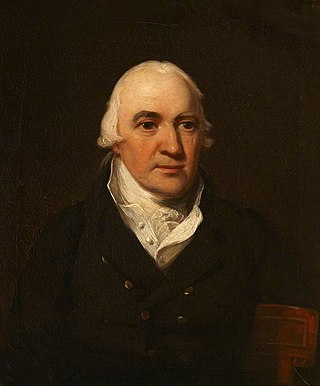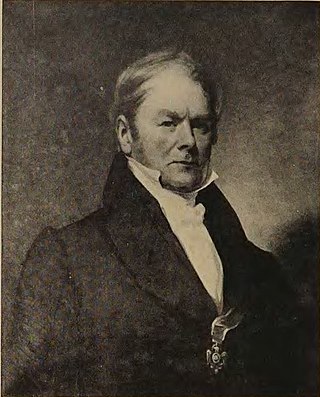Clan na Gael (CnG) (Irish: Clann na nGael, pronounced[ˈklˠaːn̪ˠn̪ˠəˈŋeːlˠ]; "family of the Gaels") is an Irish republican organization, founded in the United States in the late 19th and 20th centuries, successor to the Fenian Brotherhood and a sister organization to the Irish Republican Brotherhood.

Henry Bayly-Paget, 1st Earl of Uxbridge, known as Henry Bayly until 1769 and as Lord Paget between 1769 and 1784, was a British peer.

Stephen Moylan was an Irish-American patriot leader during the American Revolutionary War. He had several positions in the Continental Army, including Muster-Master General, Secretary and Aide to General George Washington, 2nd Quartermaster General, Commander of the Fourth Continental Light Dragoons, and Commander of the Cavalry of the Continental Army.
William Thompson was a soldier from Pennsylvania who served as a colonel and later brigadier general in the Continental Army during the American Revolutionary War.
Thomas Kittera was an American politician who served as a National Republican member of the United States House of Representatives for Pennsylvania's 2nd congressional district from 1826 to 1827.
Events from the year 1844 in Ireland.

Michael Keppele was a lawyer, alderman, and mayor of Philadelphia, 1811–1812.
George Latimer was a Philadelphia merchant and member of the Pennsylvania House of Representatives. He served as speaker of the Pennsylvania House 1794–1798.

Patrick Hayes was an Irish-born American seaman and businessman.

Morton McMichael was an American newspaper editor, publisher, civic leader and mayor of Philadelphia, Pennsylvania from 1866 to 1869.
Thomas Sergeant was an American politician and judge. He served as a member of the Pennsylvania House of Representatives from 1812 to 1814, Secretary of the Commonwealth of Pennsylvania from 1817 to 1819, Pennsylvania Attorney General from 1819 to 1820, and as an associate justice of the Supreme Court of Pennsylvania from 1834 to 1846.
The American Civil War bibliography comprises books that deal in large part with the American Civil War. There are over 60,000 books on the war, with more appearing each month. There is no complete bibliography to the war; the largest guide to books is over 40 years old and lists over 6,000 titles.

People of Irish descent form the largest ethnic group in the city of Philadelphia and its surrounding counties. The Irish have lived in Philadelphia since the pre-American Revolution period. Irishmen had participated in pro-Revolutionary activities in Philadelphia during the Revolutionary War. Like many American cities in the 19th century, Philadelphia, which was once a Quaker stronghold, changed dramatically with the influx of European immigrants. The first major influx of Irish came in 1844 from rural areas, spurred by the Irish Famine. Because of the Quaker belief and pledge of religious tolerance, Irish Catholics and Protestants, among others, made the city incredibly diverse. Philadelphia at the time had a need for industrial labor, and at the time Philadelphia was becoming a major industrial center in the United States. Irish took industrial positions. In the 1840s and 1850s, anti-Catholic sentiment grew against the Irish, and eventually led up to riots, such as the Philadelphia nativist riots and the Lombard Street riot. Eventually the Irish gained financial and social status in the latter half of the 19th century and founded institutions during the period. Many Irish Philadelphians would later move on to other major Americans cities, such as Detroit, Milwaukee, Seattle, and St. Louis.
Alexander Heron Jr. was a businessman involved in shipping in Philadelphia, Pennsylvania, during the mid-19th century.

Joseph Francis Sinnott (1837–1906) was an Irish businessman who emigrated to Pennsylvania in 1854. After thirty-two years with John Gibson's, Son and Co distillery, Sinnott became the sole proprietor in 1888. The renamed Moore & Sinnott was known as the largest distiller of rye whiskey in the US with the capacity to produce 30,000 barrels per year. As a prominent Philadelphia businessman, Sinnott also became a trustee of the Philadelphia and Reading Railroad and served as director of the First National Bank. At the time of his death, his estate was valued at 2.2 million dollars. His former home, the Joseph Sinnott Mansion, was added to the National Register of Historic Places in 1980. It is now part of the campus of Rosemont College.

George Meade was an American merchant, politician and slave trader best known for being the grandfather of Civil War general George Gordon Meade. In partnership with Thomas Fitzsimons, his firm was among the largest provision merchants during the American Revolutionary War, and helped finance the Bank of Pennsylvania and Bank of North America during the conflict—while it profited from British goods as well. Meade's business went bankrupt by 1801 due to investments in the Yazoo land scandal, and was continued by his son Richard W. Meade.










